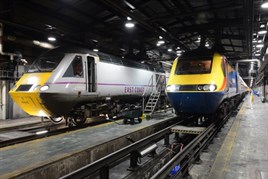Roberts has headed this project, and while Wain accepts that it will not be introduced overnight, it will (in time) be in everyday use. The approach is similar to LEAN/KAIZAN methods used at other depots, whereby a component for a particular vehicle is located in the area of the depot where that vehicle is maintained or stabled.
Says Wain: “To me, it is not necessarily that we have trains and diagrams. It is not speeding up the throughput, which we could do. It is maximising the time the staff get with the vehicles.
“These guys are 40 years old. They are old. They need TLC. They should have been withdrawn years ago. Bits wear out. There are bits we do not expect to last. We need to do things that are not ‘in the book’ to keep them running.”
She gives an example where EMT has changed the guards van door locks on the Class 43 power cars.
“That sounds easy, but you have to change the side of the door. And no train is the same. I want to give them more time.
“Porterbrook won’t do PRM-TSI work on them . This means that they will be out of use on December 31 2019. They won’t be getting the £250,000 door modifications needed.
“But we will always spend money on them. Porterbrook and EMT have just spent astronomical sums on governors for the VP185 engines. All spares have been used for the obsolete parts. There are no more governors. We even tried Australia, where they are in use. We have been told they are not available. The Viking 2200 we need isn’t available. The Viking 3500 is next, but there is no governor design so it is not compatible.”
EMT is working with Porterbrook on a Woodward governor that is compatible. A contract has been signed between MANDIESEL and Woodward whereby a ‘43’ will move to Wabtec Rail’s Brush Traction facility for modifications, probably in February. It will be there for a week, and Wain tells RAIL: “This is development work and expense. If we don’t get this done then we lose a power car when there is a failure.”
She says of Neville Hill: “This is an old site, but a strategically well-placed one. When various operators need a depot, we are put forward. It is strategically important.”
However, the layout is “fairly poor”, she explains, before adding: “It has been made to work like this.” Trains are constantly moving around, but they all (including the Northern diesel multiple units) have to move through one set of points, which can cause congestion.
There are four reception roads, as well as fuelling roads that have undergone improvement work. Previously at Neville Hill fuelling could only be done on one road, but that has changed and the depot is now more flexible.
A depot change process has also just begun regarding Intercity Express Programme (IEP) trains, which will be stabled at Neville Hill when the Hitachi-built trains are used by Stagecoach’s East Coast franchise. This work includes Network Rail putting a fuelling apron on a reception road because the IEPs have their engines in different places on the train.
Wain says there is no specific plan for the IEPs, because Neville Hill will not be a Hitachi depot. Cleaning of the trains will be carried out at the depot, and there will be access to the trains, but the main depot will be nearby at Doncaster. Technicians and engineers can be sent from there to carry out work on the new trains.
“I foresee servicing, and perhaps that’s it,” she says. “Hitachi has said that we can fuel and clean them.” She is happy with that arrangement, as it “keeps work on the site”.
Wain adds that Quality Inspectors have now been put on the fuel roads. Their jobs include fuelling and tanking the trains, as well as walking through them to check for damage inside. Once they have been inside the train, they can then concentrate on preparing it. Introducing this process has improved the speed of the trains arriving and improved the throughput.
EMT and Northern Rail share the Controlled Emission Toilet plant, which creates a bottleneck. This is a key factor for the depot, says Wain.
“If you thought about splitting up the depot between two operators it could not be more complicated,” she laughs.
She says that the natural flow of the depot - in terms of how trains arrive, are maintained and leave - would be broken. “You would be going against the flow,” she says. “There is no other access.”















Login to comment
Comments
No comments have been made yet.